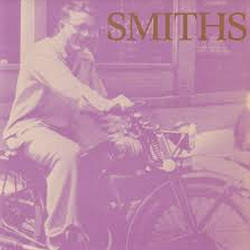The Smiths
Bigmouth Strikes Again
The Smiths
Source: Wikipedia
The
Smiths were an English rock band formed in Manchester in 1982.
The band consisted of vocalist Morrissey, guitarist Johnny Marr,
bassist Andy Rourke and drummer Mike Joyce. Critics have called them
the most important alternative rock band to emerge from the British
independent music scene of the 1980s. Q magazine's Simon Goddard
argued in 2007 that The Smiths were "the one truly vital
voice of the '80s", "the most influential British guitar
group of the decade" and the "first indie outsiders to
achieve mainstream success on their own terms". The NME named
the Smiths the "most influential artist ever" in a
2002 poll, even topping the Beatles.
Based on the songwriting partnership of Morrissey and Marr, the group signed to the independent record label Rough Trade Records, on which they released four studio albums, The Smiths (1984), Meat Is Murder (1985), The Queen Is Dead (1986) and Strangeways,
Here We Come
(1987). Four of their albums (including three studio albums) appeared
on Rolling Stone's list of the 500 Greatest Albums of All Time. They
have also released several compilations, and numerous non-LP singles.
The Smiths had several singles reach the UK top twenty and all four of their studio albums reached the UK top five, including one which topped the charts. They won a significant
following and remain cult
favourites, although they had limited commercial success outside the
UK while they were still together. The band broke up in 1987 and have
turned down several offers to reunite.
The band's focus on a guitar, bass, and drum sound, and their fusion of 1960s rock and post-punk, were a repudiation of synthesizer-based contemporary dance-pop – the style popular in the early 1980s. Marr's guitar-playing on his Rickenbacker often had a jangly
sound
reminiscent of Roger McGuinn of the Byrds. Marr's guitar-playing
influenced later Manchester bands, including The Stone Roses and
Oasis. Morrissey and Marr's songs combined themes about ordinary
people with complex, literate lyrics delivered by Morrissey with a
mordant sense of humour.
The Smiths were formed in early 1982 by Steven Patrick Morrissey, a writer who had briefly fronted punk rock band The Nosebleeds (which included guitarist Billy Duffy, who later was a member of The Cult); and John Maher, a guitarist and songwriter. Maher changed his
name to
Johnny Marr to avoid confusion with Buzzcocks drummer John Maher, and
Morrissey performed under his surname alone. After recording several
demo tapes with Simon Wolstencroft (later of The Fall) on drums,
Morrissey and Marr recruited drummer
Mike Joyce in the autumn of
1982. Joyce had formerly been a member of punk bands The Hoax and
Victim. They also added bass player Dale Hibbert, who provided the
group with
demo recording facilities at the studio where he worked as
a recording engineer. Hibbert
was replaced after one gig by Marr's
friend Andy Rourke, because Marr felt that neither Hibbert's bass
playing nor his personality fitted the group.
The band picked their name in part as a reaction against those used by synthpop bands of the early 1980s, such as Orchestral Manoeuvres in the Dark and Spandau Ballet, which they considered pretentious. In a 1984 interview Morrissey said that he chose The Smiths
"because it was the most ordinary name" and because he
thought that it was "time that the ordinary folk of the world
showed their faces." Signing to indie label Rough Trade Records,
they released their first single, "Hand in Glove", in May
1983. The record was championed
by DJ John Peel, as were all of their
later singles, but failed to chart. The follow-up singles "This
Charming Man" and "What Difference Does It Make?"
fared better when they reached numbers 25 and 12 respectively on the
UK Singles Chart.
In February 1984, the group released their debut album The Smiths, which reached number two on the UK Albums Chart. Both "Reel Around the Fountain" and "The Hand That Rocks the Cradle" met with controversy, with some tabloid newspapers alleging the songs were suggestive of paedophilia, a claim strongly denied by the group.
The album was followed the same year by the non-album singles "Heaven Knows I'm Miserable Now" and "William, It Was Really Nothing", which featured "How Soon Is Now?"
on its
B-side. Securing the band's first top ten placing, "Heaven Knows
I'm Miserable Now" was also significant for marking the
beginning of engineer and producer Stephen Street's long-term working
relationship with the band.
More controversy followed when "Suffer Little Children", the B-side to "Heaven Knows I'm Miserable Now", touched on the theme of the Moors murders. This caused an uproar after the grandfather of one of the murdered children heard the song on a pub jukebox and felt
the band was trying to commercialise the murders.
After meeting with Morrissey, he accepted that the song was a sincere
exploration of the impact of the murders. Morrissey subsequently
established a friendship with Ann West, the mother of victim Lesley
Ann Downey, who is mentioned by name in the song.
The year ended with the compilation album Hatful of Hollow. This collected singles, B-sides and the versions of songs that had been recorded throughout the previous year for the Peel and Jensen shows.











0 commenti:
Posta un commento
Tutti i commenti prima di essere pubblicati verranno sottoposti a moderazione da parte dell' amministratore.